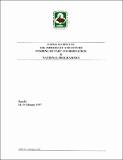| dc.description.abstract | This document is to facilitate the discussions between the PARC-advisers and the representatives
of the Commission of the European Union and the Delegation of the EC (Kenya), as outlined in the
attached Agenda. In order to ensure the immediate and mid-term sustainability of the ongoing
PARC-programme, the following issues - described below, and in detail in the Annexes, and
visualised in the attached Gantt-chart - ought to be addressed (figures are - in most cases - prudent
estimates. Dates and durations of projects are approximative):
1. CO-ORDINATION:
The regional PARC Co-ordination units (Nairobi and Bamako) do urgently need bridging funds to
cover the period 1/4/97 to 31/3/99. An amount of 4,5 million ECU is therefore requested (an
includes additional funds 0.73 million ECU to support the Epidemiology component from May '89
to April '99). The Communication component will embark on the formulation of a Prodoc. for
Phase III to cope with the delays in the implementation of Phase II.
2. NATIONAL PARC PROGRAMMES:
East-Africa: Apart from Eritrea and Uganda which have just started a new programme, the
other countries (Tanzania, Ethiopia, Kenya, Djibouti) do need an urgent revision, evaluation and/or
signing of the project agreement in view of the imminent end of the present phase. Conflict-prone
areas as Sudan and Somalia do need provisions for immediate assistance when an improved
situation would occur, and assistance do deal with the prsent situation, and a relaxation of
administrative rules for advisers on mission.
West & Central Africa: 24 countries are concerned by the PARC programme.
One group of 10 countries has a PARC programme running. Three of them (Cote
d'Ivoire, Mali and Guinee Bissau), however, are to terminate by the end of '97 and '98. The other
remaining 7 countries are covered until the year 2000. As far as these countries are concerned, and
pending on their present status, the focus of discussions will be on a) alignment of national
implementation with the EU-evaluation report (e.g. stopping vaccinations), b) the formulation of a
follow-up PARC programme (e.g. Cote d'Ivoire, Mali and Guinee Bissau). Mali will undergo a
mid-term evaluation in 1997. Discussion will be held with CAR, Guinee-Conakry, Chad, Burkina
Faso, Mauritania, Niger and Senegal to anticipate the cessation of vaccinations and set-up of a
epidemio-surveillance system. The issue of emergency funds is to be tackled urgently.
Fourteen countries have no active PARC programme. However, ten among them, received
PARC-funding in the past (Benin, Burundi, Cameroon, Gabon, Gambia, Ghana, Liberia, Nigeria,
Rwanda and Togo). The EU should give special attention to sonic of them, in view of their
geographic or strategic location as far as the eradication of Rinderpest (and CBPP) is concerned:
Gambia, Ghana, Nigeria and Cameroon, and in Central Africa, Rwanda and Burundi. | |
